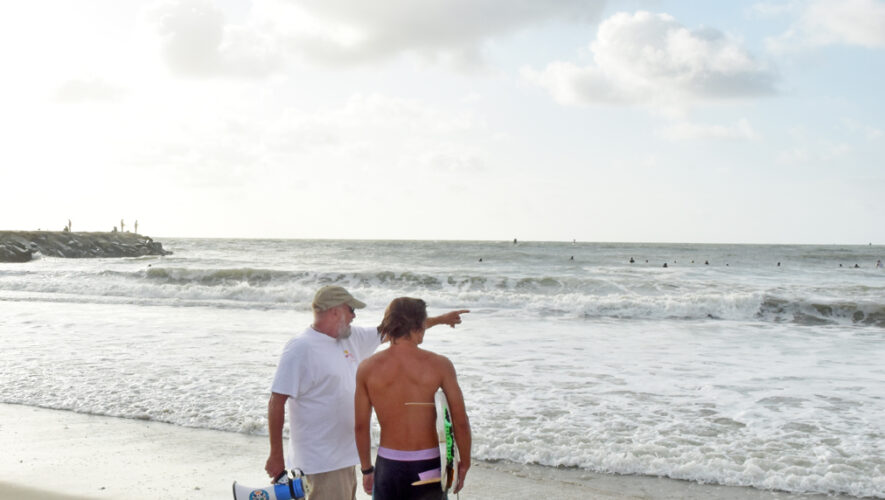They are upset by rise of supper clubs that allow patrons to bring alcohol
By ERIC AVEDISSIAN/Sentinel staff
OCEAN CITY – Opponents of supper clubs held a public forum Feb. 25 in the Ocean City Free Public Library and proposed a public referendum that would tighten the ordinances allowing restaurants to charge membership fees so patrons can bring and consume their own alcohol.
From the time of its founding, Ocean City has had a long history of prohibiting alcohol sales and public consumption.
In 1909 the city passed a law prohibiting the sale or manufacturing of alcohol, making Ocean City a dry town. Delivery of wholesale merchandise on Sundays and the consumption of alcohol on beaches was prohibited in 1951.
The city passed an ordinance in 1958 forbidding the consumption of alcoholic beverages in public areas.
In 2012 a public referendum that would have allowed Bring Your Own Bottle (BYOB) in certain restaurants was overwhelmingly rejected, 3,137 to 1,425.
The referendum’s defeat was a victory for those who believed allowing BYOB would tarnish the city’s reputation as a family-friendly resort, even though alcohol is consumed in private homes and parties especially in summer months. Certain private clubs and organizations also allow alcoholic beverages for paying members.
But in recent years, dinner clubs have begun to appear, offering annual memberships that allow customers to bring and consume their own wine. The participating restaurants can host club members on certain nights, or hold the club in rooms only accessible to members.
In the past, exclusive clubs charging members fees have legally circumvented the city’s stringent laws regarding alcohol.
Cousin’s Restaurant at 104 Asbury Ave., Capt. Bob’s at 9 E. 55th St., Dockside Kitchen at 228 Bay Ave., and Jon & Patty’s Coffee Bar & Bistro, 637 Asbury Ave. host dinner clubs. The Flanders Hotel at 719 11th Street and the Boardwalk hosts Club 1923, its own members only dinner club.
Dinner clubs charge anywhere from $10 to $250 for annual memberships
Resident David Hayes said the mayor and council haven’t acted to enforce the laws against dinner clubs.
“They’re in violation of the state statutes that govern clubs,” Hayes said. “They’re saying these things are clubs, but you have a restaurant one night that’s a club the next night. The owners are all the same people.”
He noted the comparisons made with the Riverboat Club and Yacht Club – two private clubs in the city – were not comparable to the dinner clubs that some restaurants host.
“They’re (restaurants) for profit. That’s not a club. With a club you can’t sign up at the door. You have a membership list. You have to belong to it. It’s just that they wanted to leave it undefined so that people could slide in,” Hayes said.
City solicitor Dorothy McCrosson said no laws were broken by having restaurants offer memberships to their clientele and starting supper clubs.
“They were unable to point to any law that the supper clubs violate. There’s no ordinance, there’s no state statute, there’s nothing,” McCrosson said. “They just couldn’t say anything about that.”
Hayes said opponents could go to Superior Court and file a writ of mandamus and ask the city to enforce the laws.
A writ of mandamus is an order from a court to a government official that orders the official to fulfil his or her official duties.
Hayes also proposed an ordinance that would end supper clubs. He said if council rejects the ordinance, then the voters should decide the issue via public referendum. Hayes said opponents need to get 612 signatures, or 15 percent of voters who voted in the last general election, to get the issue placed on the ballot.
“We’ve already started getting signatures on the petition. I don’t see that there’ll be much of an issue in getting our signatures and we’ll present them to the city,” Hayes said. “The mayor says ‘I’ll talk to anybody who wants to talk.’ We might talk, but once we have our signatures that’s when he’s going to have to listen.”
McCrosson said Hayes wouldn’t share the proposed ordinance’s contents at the meeting.
“They keep calling them BYOB supper clubs. They are not BYOB clubs. BYOB permits consumption of alcohol in public. That’s not what’s happening here,” McCrosson said. “When they say BYOB was voted down they are correct. BYOB is not permitted in Ocean City. Everybody agrees on that. They’re interpreting these supper clubs as being BYOB and that’s not legally or factually correct.”
Hayes told the Sentinel that the proposed ordinance revises Section 4-1.5 of the Ocean City Municipal Code to specifically exclude supper clubs, members-only dining areas and member-only dining events from the definition of a private gathering, party or affair.
Restaurant owner: we’re complying with the law and it’s not BYOB
Bill McGinnity, owner and executive chef of Cousin’s Restaurant, said restaurants are complying with the law when they have supper clubs.
“I just don’t think their facts are straight,” McGinnity said of the supper club opponents.
McGinnity started a dinner club at Cousins in 2018 and club membership is around 200.
Membership at Cousin’s dining club costs $65 annually, which includes membership for the whole household.
“We’ve taken time to create a business to keep locals on the island. It is not BYOB. This is a private dining club. This is the same as me coming into your home, you paying me to cater a meal in your home and you drinking your own alcohol. The restaurants are privately-owned places,” McGinnity said. “They allow the public to come in and when they allow the public to come in it is a private facility.”
McGinnity refuted criticisms that the supper clubs are not real clubs because they charge annual memberships.
“There’s dues, there’s guidelines, there’s regulations. It is a club and it’s a dining club,” McGinnity said. “It’s allowing you to enjoy culinary experiences on the island year-around.”
McGinnity said since starting the supper clubs, he was able to hire workers in the offseason and keep his business running in the late fall and winter months.
“Now I’m employing local residents year-round, helping the local economy, allowing locals year-round residents to stay on the island to enjoy a great meal. A lot of the members know each other. It’s their night. They’re not coming to dinner and going out. This is their night. The average age of these people is late 50s and up,” McGinnity said.
He also rebuked the characterization that the dinner clubs are BYOB.
“BYOB is the ability to bring wine and beer to a public restaurant. This is not public. This is private,” McGinnity said.
McGinnity compared the supper clubs to consuming alcohol in a private residence.
“This has nothing to do with a liquor license. It has nothing to do with profiting from alcohol. We cannot charge a corkage fee,” McGinnity said. “You’re drinking your own alcohol in basically a private residence. Anybody that has a building that they own, they’re paying the mortgage on is theirs. I can allow or not allow you to come onto my property at any given time. It’s not about exclusion of people it’s about inclusion of people to stay on the island.”
McCrosson said attendees at the meeting didn’t see the difference between supper clubs and allowing BYOB.
“I think a lot of people in that room thought that it was BYOB and the council and the mayor were looking the other way and neither of those things is true,” McCrosson said.
In a statement, Mayor Jay Gillian said the city “is in no way condoning private supper clubs.”
“There has been no change to the longstanding ordinances that prohibit the sale and consumption of alcoholic beverages in public places,” Gillian said. “Ocean City police are aware of the trend and have issued summonses to some ‘private clubs’ openly violating these ordinances. But under existing state and local law, the city has no jurisdiction over what takes place on private property. Preserving Ocean City’s reputation as ‘America’s Greatest Family Resort’ is critical to every resident, property owner and business in town, and I share the concerns that are being raised. I remain open to any suggestions for what the city can do – within the law – to make sure these clubs do not change the character of the city.”
Hayes said he doesn’t want to return to the Blue Laws; he just wants the 2012 referendum banning BYOB to be enforced, and regards dinner clubs as a way for restaurants to subvert the issue.
“I’m not a crusader or fanatic. This is something where we did a BYOB referendum and the very people who were supporting the referendum were allowed to set up the restaurants and bring in beer and wine,” Hayes said.
He said the city should have held a public meeting on restaurants sponsoring dinner clubs.
“We should have talked about this. Then we would have gone forward and everybody would at least speak their mind but doing this in the shadows and all under the table and keeping it hush-hush is not the right way to do it,” Hayes said.



